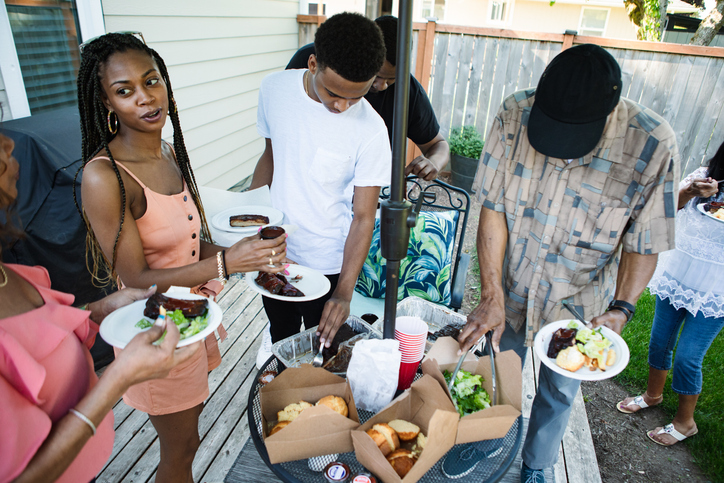‘We Outside!’: A Brief History Of The Black People Cookouts
Source: RyanJLane / Getty
Black people love a good cookout. It’s a time for us to reunite and bond with our close friends and extended family. It’s also the best time to chow down on some good old barbecue. If your family really does it up, you’ll have all the meats, sides, and fixing on deck for the big occasion. There’s nothing like smelling the charcoal burn before uncle Dan throws on an impeccably seasoned burger patty to grill away, and if you have room, he might even throw on a hot dog for your to scarf down too. Every family has a relative like Uncle Dan who means business when he gets behind that firey grill.
The fourth of July and Memorial Day are some notable holidays where Black folks go all-in with massive cookouts, but you might parlay with friends and family for a cookout in honor of a loved one’s birthday or for no reason at all but pure joy and entertainment, if the weather’s nice. Why has sparking up the grill become such a huge part of our culture? Let’s take a look at the brief history behind the legendary cookout, one of America’s most famous pastimes.
When did the cookout phenomena start?
European explorers discovered the tasty tradition while sailing across the sea in search of spices sometime in the 1400s, Food52 notes. Along their travels, they stumbled upon the Caribbean where they found Taíno tribe members cooking up delicious food on long wooden frames. Tribe members called the technique “barbacoa.” The explorers traveled to the U.S. with the fascinating cooking hack in tow and the phenomena quickly spread, traveling to the areas of Virginia, the Carolinas, Alabama, and Georgia. Over time, the term “barbecue” was born.
Enslaved African Americans spread the BBQ tradition across the U.S.
Enslaved African Americans played a huge part in spreading the BBQ technique across the U.S. during slavery. In preparation for the cookout, slaves were normally tasked with doing the hard work to keep the fire going, which meant hours of digging trenches, monitoring coals, chopping up wood, and even cooking the meat. Historians believe this is why the American pastime is heavily entrenched in Black culture today. As the BBQ evolved, slaves incorporated spice and created sauces, and marinades that enhanced the flavor of the smokey meat, and it was passed down to the next generation as time progressed.
BBQ became political in the 1800s
During the colonial era, smokey outdoor barbecues were often used to build up political support for prospective candidates. Politics would bribe voters with a little tactic called “treating” where they would offer up the finest booze and a ton of smoked meats to gain political backing, according to Robert F. Moss’s book Barbecue: The History of an American Institution. President Andrew Jackson took the tradition to the next level, often holding a massive barbecue to help promote his policies. Historians say that Jackson put on his very first White House barbecue in 1829. The concept of using the good old BBQ as a political tool carried on throughout the Civil War. Jim Auchmutey’s book Smokelore suggests that BBQs were used as peace gatherings to reunite vets from the North and South.

